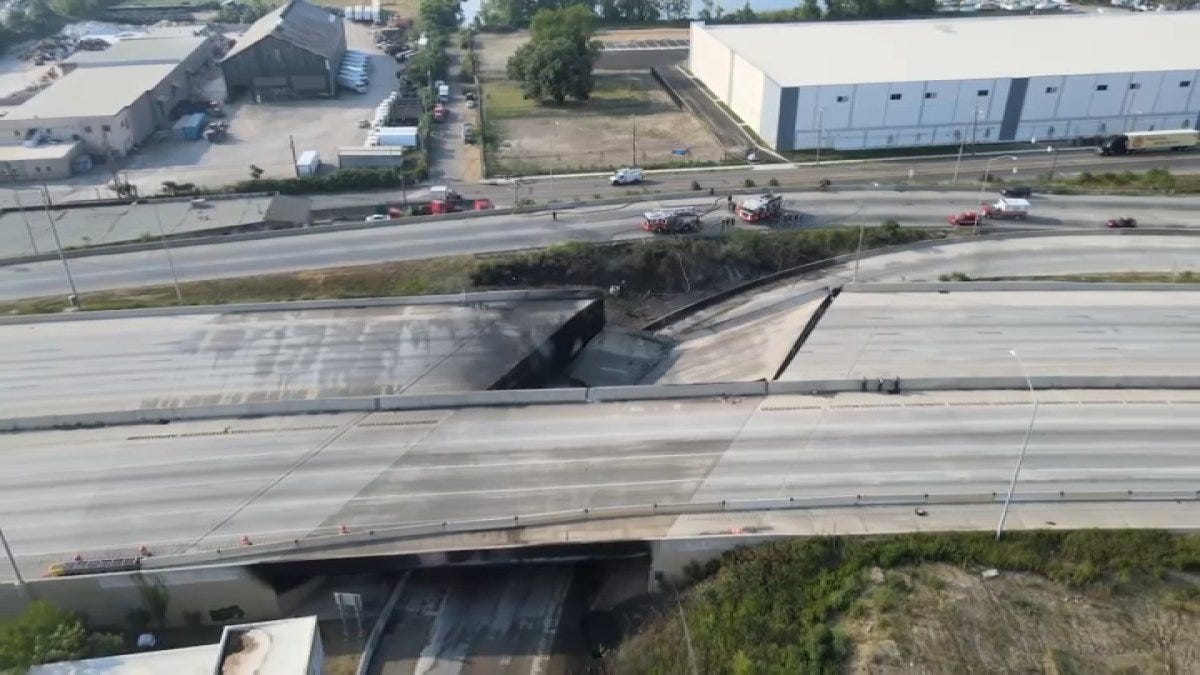Under the Bridge - MMD#370
Good day my good friend.
Some big news for you all today. If you love transport (I assume you do) and you love doing things a bit differently, the annual transport unconference Mobility Camp is happening again this year. It will be on Tuesday 26th September, taking place at IET Austin Court in Birmingham, UK. And I would love to see you there!
Tickets are now on sale, so grab them while they are hot!
If you have any suggestions for interesting news items or bits of research to include in this newsletter, you can email me.
James
I, Collapse
The collapse of the I95 Freeway in Philadelphia has generated plenty of commentary. From how it will disrupt supply chains, to the very human impact of someone dying under the collapsed bridge. But there has also been chatter about how this links into a wider movement of tearing down highways. Now, I support highway teardowns in favour of making cities more liveable. In fact, I highly recommend the M32 in Bristol be first in line for the bulldozers. But, we have to think these things through.
The section of the collapsed freeway is within the Philadelphia city limits. And the I-95 plays a role as a strategic highway both within the city and more widely across the North East of the USA. What we know from other highway removals is that while much in the way of traffic disappears, much also diverts. And how that traffic is handled in a way that meets wider liveable city objectives is important. Don’t just tear down highways willy-nilly. Think about what their impacts are, and plan for them.
Just transitions in places where transport options are limited
We talk a lot about just transitions. But we talk about it a lot in the context of urban areas. The question then is how do you achieve a just transition when your tools available for making that transition are either radically different or lacking. I am talking about rural areas of course. Remember, a good 40% of the world live in rural areas. So how do we translate the just transition into the variable rural context?
Early engagement work with stakeholders has identified some avenues to explore. Firstly, if you are relying on individual behaviour change, that will crash and burn in rural areas. Civic associations play an outsized role in rural areas in giving transport choices. There also needs to be a detailed understanding of spatial and temporal synergies (think community hubs where a lot of activities are in a small area) in order to make any transport services worthwhile. This calls for detailed, quality data, and not lots of data.
Random things
These links are meant to make you think about the things that affect our world in transport, and not just think about transport itself. I hope that you enjoy them.
Recycling Plastics releases Microplastic pollution in the Water and Air (Angry Bear)
Ocean temperatures are off the charts, and El Niño is only partly to blame (Phys.Org)
Why the U.S. Electric Grid Isn’t Ready for the Energy Transition (New York Times)
Plagiarism Engine: Google’s Content-Swiping AI Could Break the Internet (Tom’s Hardware)
What’s Killing Productivity? Some Think It’s the Banks (Wall Street Journal)
Something interesting
You may be interested in this video on the battle between Airbus and Boeing (and increasingly Comac from China) not because of its transport content, but how transport intersects with with politics. Governments create, shape, and directly intervene in markets, often for political reasons. And the aviation industry is a perfect example of that.
If you do nothing else today, then do this
Read this article on Dishonest Diversity. Get mad, and think about how you can take on any of this bullsh*t in your organisation. Don’t talk a big game on diversity, play a big game.

